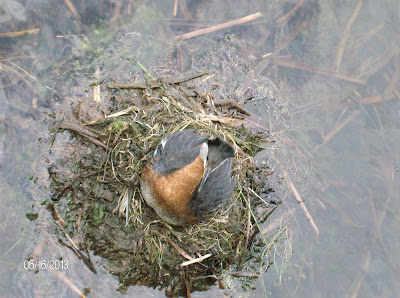Red-necked Grebes are very common here. Usually you see a nest 15-20 m(45-60 ft.) off shore. They are very visible at that distance. For this nest , you are right above them ...about 2 m (6 ft).
Unless I would be right there when the eggs hatch I would not see the new grebes. The little fellows leave right away and ride on the parent's back even when the parent dives.
 |
| This bird was right in the area of the nest ready to trade sitting duties. |
 |
| Patiently waiting an exchange |
 |
| Away I go. There was a lot of squawking when the bird came off the nest . The bird coming off the nest left the area immediately. |
 |
| The usual messy nest just above water level |
 |
| And finally settling down for brooding duty. |

Such attentive parents to those eggs. marvelous shots.
ReplyDeleteYou'd wonder how these eggs are kept at a high enough temperature when they're right above the water.
Deleteoh, they are SO cool! and to see the nest like that, too! i've never seen these in person. :)
ReplyDeleteCool! I have never seen a grebe's nest before. It's fun that it is next to the viewing area.
ReplyDeleteThey're common here. There are probably a half dozen nests on this small lake...50-60 acres.
DeleteThey are really pretty! What fun to see them, AND the nest too. WOW!!
ReplyDeleteYou don't often get to see birds from that viewpoint. You'd have gone nuts if you were there. They didn't move away.
DeleteAmazing birds
ReplyDeleteGrebes certainly lead a different life.
DeleteGreat shots indeed Red! :-)
ReplyDeleteKind regards from the Netherlands,
Gert Jan
Thanks. I have finally weakened and have your blog translated.
DeleteGreat photos of the nest! I have never seen a grebe. I like their tufts of feathers on top of their head : )
ReplyDeleteThere are many types of grebes and they are quite common. They seem to have a bit of a cow lick like mine!
DeleteThanks for the view of the nest..it is really close to the top of the water. If it rains I bet they get flooded out. I have not seen a Grebe nest before..so thanks Red!
ReplyDeleteHappy Fathers Day:)
No, it won't flood. If you can believe it the nest floats.
DeleteThat is really fun to see! Aren't they beautiful, Red?!
ReplyDeleteRe: your question about IDing plants, I cannot remember. THere are lots of places to ID birds and bugs! Let me ponder that one!
cheers from rainy Perth!
They are handsome dudes. Thanks for checking on the plant site.
DeleteYou got some wonderful shots Red!
ReplyDeleteI didn't know much about grebes so you have enlightened me. The babies go under too - bet that's a wake up call for them. :)
Looks like a dangerous place for a nest but I guess they know best.
The Nature Center was certainly worried about this location. So far everything has been okay. They should be hatching pretty soon.
DeleteHow sweet that they change places and share the parenthood. The humans can learn from the birds.
ReplyDeleteA number of bird species do share the incubation duties.
DeleteStunning photos - I love bird photography and bird watching - so thank you for sharing.
ReplyDeleteThanks! I don't have the equipment to do "stunning" bird stuff. This one was easy because it was so close.
DeleteKinda reminds me of the parenting of our Canadian Geese - both parents feed and care for the newborn. Stunning photos Red and so fortunate for you to get these , as they swap places for warmth and protection of their little family.
ReplyDeleteI got lucky for the whole thing. It was easy because I was right over them. It all happened so fast I didn't realize what was going on.
DeleteI hope you will be able to show us the chicks when they hatch. Very cool, Red. I feel honored to be part of their admiration society. :-)
ReplyDeleteProfessional ornithologists would be thrilled to come across an opportunity like this! How neat is that!
ReplyDeleteIt was lucky. This is a long observation deck which goes out over the wetland. Sometimes birds have built under the deck and you can't see the nest.
DeleteWOW! The nest floats! This whole post is really cool, Red. I have never seen the birds nor a really wonderful water nest!
ReplyDeleteLinda
http://coloradofarmlife.wordpress.com
¸.•°❤❤⊱彡
Quite a few grebes have this type of nest . So do loons.
DeleteMost interesting divers. We mainly have the pied billed variety here and I've never seen this species...:)
ReplyDeleteThis was pretty cool that you got those shots Red , right in time for the changing of the guard ...um setters.lol
ReplyDeleteI got completely lucky!
ReplyDeleteWhat a wonderful series of photos! I love that messy nest.
ReplyDeleteA terrific collection of images, Red. It's such a wonderful time of year to see life happening.
ReplyDeleteWhat a great view of the nest you have! These are great photos, and I'm hoping for some when those eggs are hatched!
ReplyDeleteI enjoying learning. Great pictures and post.
ReplyDeletewhat a cool series of shots...and great capture of life as it happens in nature....congrats on the POTW over at Hilary's
ReplyDeleteSpotting a nest filled with eggs is awesome! Thanks for sharing. And congrats on your POTW from Hilary.
ReplyDelete